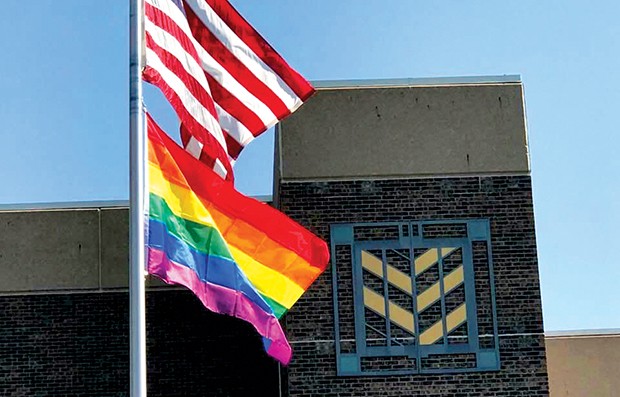“I remember coming into the hospital for my interview and seeing the pride flag flying out front. I thought to myself, ‘It isn’t pride month, there must be some special event or something that they would be flying it,’” recounts Rob Weis, a part-time therapist at Lincoln Prairie Behavioral Health (LPBH), a Springfield inpatient psychiatric hospital operated by United Health Systems. Weis is also an active member of the Coalition of Rainbow Alliances in Springfield (CORAL), a nonprofit volunteer group that facilitates networking for the central Illinois lesbian, gay, bisexual and transgender community. Weis would come to learn that the pride flag is always on display at LPBH.
“When I first came out,” Weis continued, “My best friend’s dad sat me down and said, ‘You are loved and you are perfect just as you are,’ and I will be forever grateful to him for that. For children who arrive at our hospital at a time of crisis, seeing that flag out front sends a similar message. It serves as a symbol of acceptance and inclusion that can have an incredibly powerful impact.”
Located in Springfield, LPBH serves children and adolescents ages four to 17 who are struggling with depression, anxiety, trauma and other serious mental health issues. LPBHC is an 97-bed acute care inpatient facility providing a range of inpatient and outpatient services for children and adolescents aged three to 17. LPBH employs approximately 275 people and is operated by Universal Health Services, one of the nation’s largest hospital management companies with over 350 facilities across the U.S, Puerto Rico and the U.K.
Since 2018 LPBH has been proactively creating a specialized care program for LGBT+ adolescents in Illinois who are struggling with mental health issues. Suicide risk in LGBTQ people is thought to be highest during their teens and early twenties, according to the National LGBT Health Education Center. A study conducted in 2015 found that more than four-and-a-half times as many LGB-identified high school students reported attempting suicide in the past 12 months compared to non-LGB students (29.4% vs 6.4%), and 42.8% of LGB youth seriously considered suicide.
For transgender youth, the statistics are even more worrisome. According to the American Federation for Suicide prevention, 46% of transgender males and 42% of transgender females have attempted suicide. That statistic increases to 51% in patients who reported that they had to teach their doctor or other health care provider about transgender/gender non-conforming people in order to get appropriate care. A devastating 61 percent of transgender people who reported that “A doctor or other provider refused to treat me because I am transgender/gender nonconforming” said they had attempted suicide.
These numbers illustrate the need that LPBH is seeking to address with its creation of a specialized program for inpatient LGBT+ patients. “We identify the patients when they first come into admissions that identify as LGBT+ and offer them the option of taking part in the specialized track. And any patient who is not identified in admissions can also discuss with their therapist being part of the programming,” explains Rob Hittmeier, the chief operational officer of LPBH.
New hires at LPBH go through an orientation in which they are taught about the specific needs of LGBT patients, including how to talk to them about their sexual orientation and gender identity in a respectful and understanding way. The patients in the program have the option to attend group sessions that specifically address the impact that their sexual orientation and gender identity have on their mental health. The group sessions include art therapy, spirituality discussions and psychotherapy, all in an environment that is open and accepting of the adolescents’ development. LPBH has also partnered with the Phoenix Center and Parents and Friends of Lesbians and Gays (PFLAG) to bring in mentors and professionals from the LGBT community to participate in group sessions.
Earlier this year, at its 2019 Spring Gala, the Coalition of Rainbow Alliances (CORAL) recognized LPBH for its positive impact on the LGBT community. The two entities have continued to work together to further bolster the LGBT programming at the hospital. Currently CORAL is creating a dedicated lounge for LGBT patients to use during their group therapy sessions. Robert Glatz, an inpatient therapist at the hospital and the coordinator of LGBT+ services, described the project: “My vision for the lounge is to create a space that feels like any teenager’s basement or living room at home where they can hang out. So many of our kids come from environments where they cannot talk openly about their sexual orientation or gender identity. And having a space to do this is necessary to be able to recover from depression, anxiety or trauma.”
A large percentage of the kids who take part in this program come from rural areas where they have no one to talk about these deeply personal issues. According to Glatz, many of the program participants say in the group sessions that they have never been able to talk openly like this before in their lives.Glatz points out that when one comes from a small town with no access to any LGBT affirming community, the only place that they can go to for information is the internet. And while there are many positive and informative LGBT resources available online, there is just as much misinformation that can be harmful or even dangerous, making the sort of specialized programming offered at LPBH all the more critical.
Ashley Meyer is a Springfield-based cook who became a food writer after inheriting her late mother’s food column in Illinois Times. The love of good food runs in the family, and she looks forward to the weekends when her brother, Robert Glatz, a social worker with Lincoln Prairie Behavioral Heath, will cook up a pot of his signature jambalaya for family dinner.


